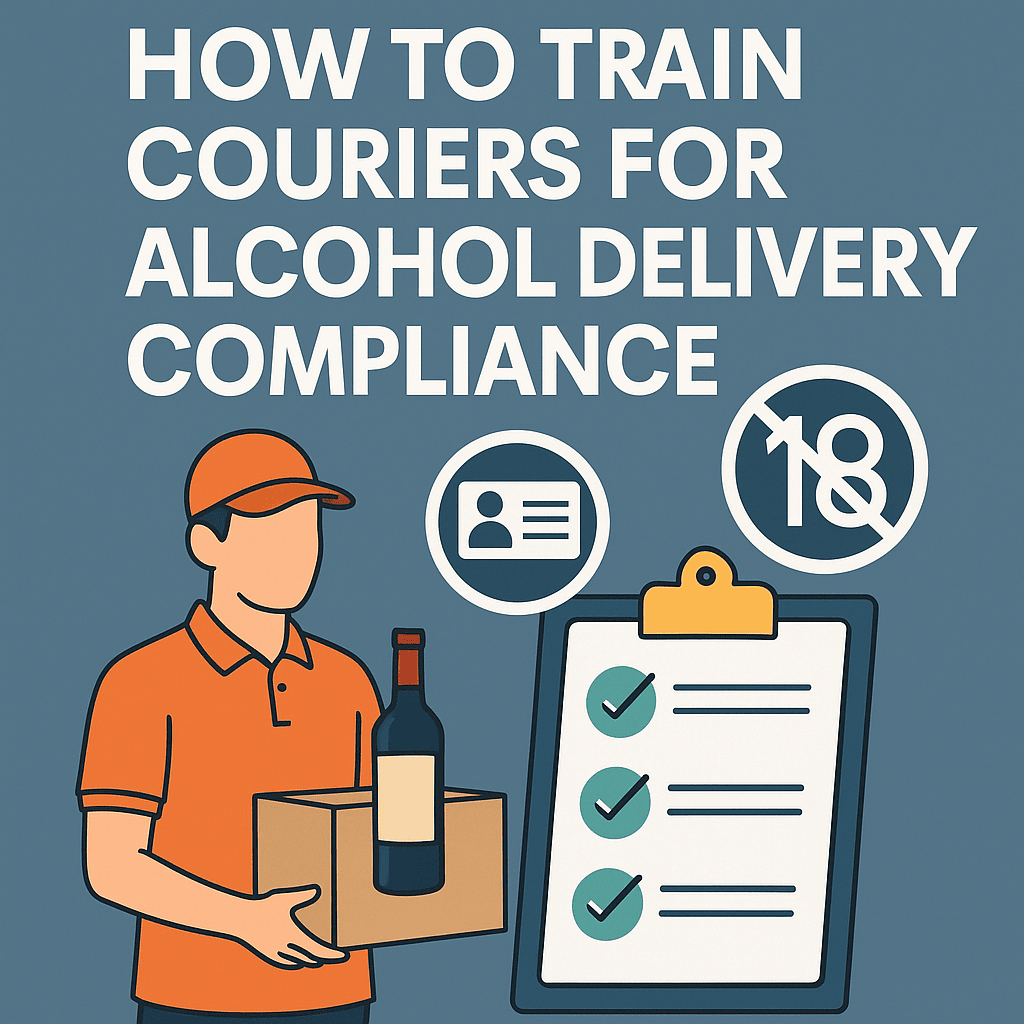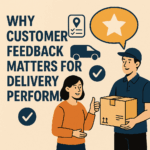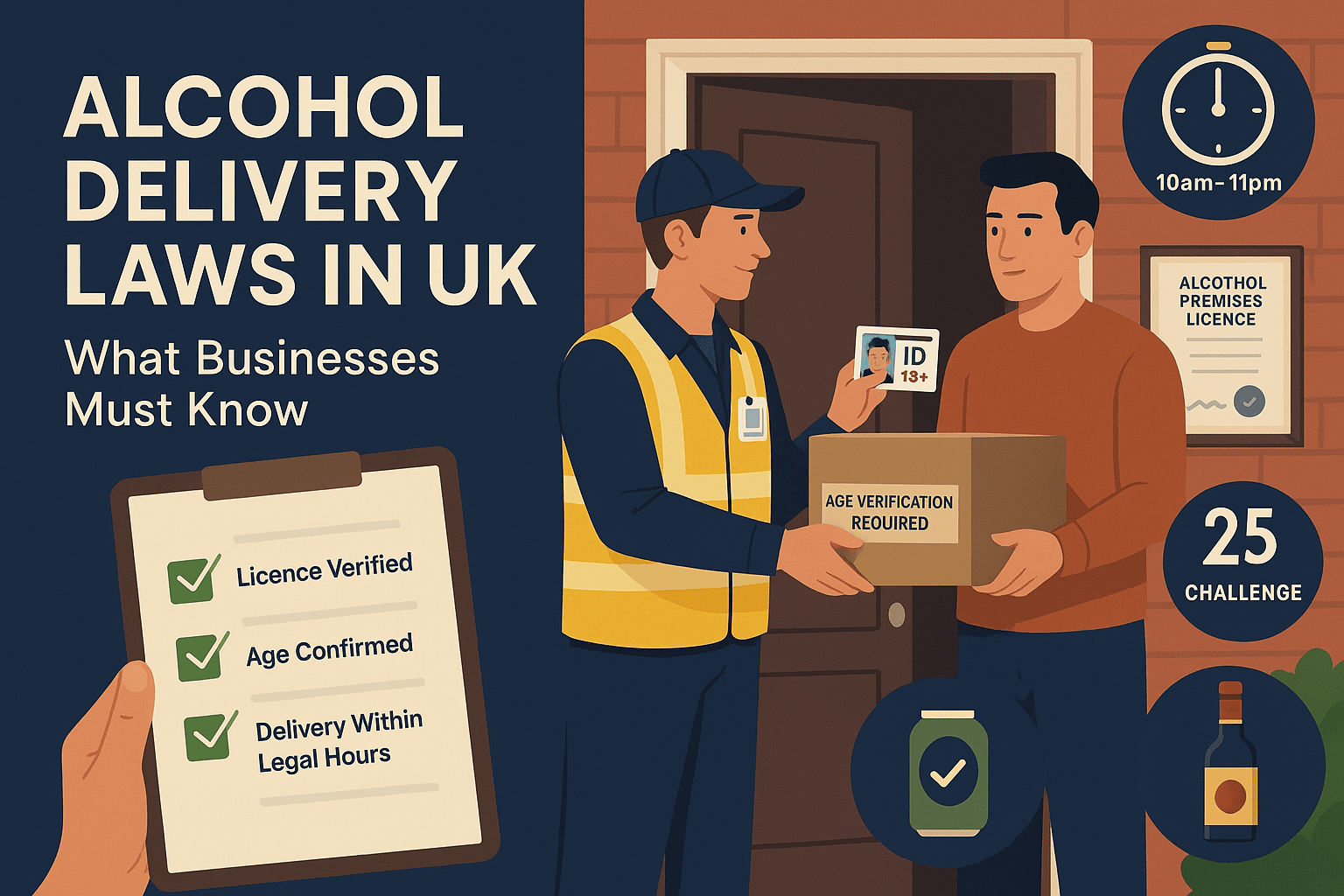A Complete Guide for Delivery Platforms and Retailers
As the alcohol delivery industry continues to expand across the UK and globally, ensuring alcohol delivery compliance has become a top priority for businesses, couriers, and regulators alike. Whether you’re a retailer offering on-demand alcohol delivery or a platform like Getfor powering courier services such as OrderFor, the need for proper training of couriers is crucial to avoid legal issues, fines, and reputational damage.
In this guide, we’ll explore the best practices, legal requirements, and step-by-step courier training strategies that help ensure your alcohol deliveries stay compliant, safe, and professional.
Table of Contents
- Why Alcohol Delivery Compliance Matters
- Understanding Local Alcohol Delivery Laws
- Key Risks of Non-Compliance
- Courier Training: The Foundation of Compliance
- Step-by-Step: How to Train Couriers for Alcohol Delivery Compliance
- Verification Tools and Technology for Couriers
- Common Scenarios and How Couriers Should Respond
- Ongoing Compliance Monitoring and Refresher Training
- How Getfor and OrderFor Ensure Alcohol Delivery Compliance
- Conclusion: Protect Your Business and Empower Your Couriers
Why Alcohol Delivery Compliance Matters
With the surge in on-demand alcohol delivery services, the responsibility of ensuring age-restricted products reach only legal recipients falls on the retailer and the courier.
Alcohol delivery compliance ensures that:
- Alcohol is not sold or delivered to minors
- Deliveries follow local licensing laws
- Couriers understand their legal responsibilities
- Businesses avoid costly penalties, fines, or shutdowns
As consumer demand grows, compliance becomes both a legal necessity and a key competitive differentiator.
Understanding Local Alcohol Delivery Laws
In the UK, alcohol delivery is regulated under the Licensing Act 2003, which outlines:
- Minimum legal drinking age (18+)
- Requirements for age verification
- Licensing obligations for premises and delivery
- Delivery hours (varies by licence)
In addition to national laws, local councils may impose specific conditions. For example:
- Deliveries only during certain hours
- Specific record-keeping protocols
- ID checks required at the point of delivery
If you’re operating internationally, always consult the specific jurisdictional laws. For instance:
- US states vary drastically—some ban alcohol delivery altogether.
- Australia and Canada have regional rules and delivery hour restrictions.
Key Risks of Non-Compliance
Failing to properly train couriers for alcohol delivery can lead to:
1. Legal Consequences
- Fines up to £20,000 for selling alcohol to minors
- Licence suspension or revocation
- Criminal charges against delivery personnel and business owners
2. Reputational Damage
- Bad press, especially in high-profile underage delivery cases
- Loss of customer trust
- Backlash on social media
3. Platform Liability
- Third-party platforms like OrderFor may face shared responsibility if couriers breach rules
- Risk of bans from major app stores or e-commerce marketplaces
Courier Training: The Foundation of Compliance
Courier training for alcohol delivery compliance should be mandatory and cover both legal and practical knowledge. Proper training empowers couriers to:
- Recognize and validate acceptable forms of ID
- Handle edge cases like intoxicated customers or suspicious orders
- Use verification tools confidently
- Maintain professionalism and safety
Training should be updated regularly and form part of onboarding and refresher protocols.
Step-by-Step: How to Train Couriers for Alcohol Delivery Compliance
Step 1: Start With the Law
Begin with a solid foundation of legal education. Couriers should understand:
- Legal drinking age in the operating country
- Legal ID types (UK: Passport, Driver’s Licence, PASS card)
- Delivery time restrictions
- What constitutes refusal (e.g., intoxicated, aggressive, underage)
✅ SEO Keywords: alcohol delivery laws, courier legal training, UK alcohol delivery compliance
Step 2: Create a Digital Alcohol Delivery Training Module
Make compliance training accessible via mobile devices with an online course or app. Include:
- Interactive quizzes
- Real-world scenarios
- Video demonstrations
- Policy downloads
Platforms like Getfor or Shopify-based services can integrate this into the onboarding flow.
Step 3: Teach the Challenge 25 Policy
The Challenge 25 policy is widely used across the UK and should be taught as standard:
- If a customer looks under 25, always request ID
- Accept only official photo ID
- Do not deliver if ID is invalid, damaged, or refused
🔍 SEO Keywords: challenge 25 courier training, age verification alcohol delivery, ID checks for alcohol delivery
Step 4: Train for Contactless & App-Based Verification
Many modern platforms now include in-app verification tools, such as:
- Customer age verification at point of order
- Age-check photo uploads
- Barcode scanning of ID via courier app
Training should include how to use these tools correctly to log the ID check, take evidence photos (if required), and escalate problems.
Step 5: Roleplay Common Scenarios
Help couriers build confidence through roleplay and scenario training:
- What to do if the recipient refuses ID
- What if someone else answers the door?
- What if the customer is intoxicated?
- What if the customer becomes aggressive?
Use a mix of video simulations and in-person discussion groups (if possible).
Step 6: Provide a Courier Compliance Handbook
Each courier should receive a concise handbook (physical or digital) with:
- Acceptable ID types (with images)
- Quick reference flowchart for delivery decisions
- Contact numbers for escalation
- Details of their personal legal responsibility
Step 7: Certify and Track Completion
Only allow certified couriers to deliver alcohol. Use digital certificates, in-app verification, and QR-code scanning to ensure every driver has completed:
- Alcohol compliance training
- Challenge 25 policy module
- Verification tool walkthrough
✅ SEO Keywords: alcohol delivery training certification, courier compliance tracking, training for delivery drivers UK
Verification Tools and Technology for Couriers
Platforms should equip couriers with easy-to-use tools that streamline alcohol compliance. These can include:
- In-app age-check confirmation screens
- Real-time ID scanning with OCR
- Facial matching for photo ID
- Order geofencing to verify delivery zone
- Automated incident reporting tools
Getfor and OrderFor are examples of platforms investing in such tech to enhance both compliance and efficiency.
Common Scenarios and How Couriers Should Respond
Scenario 1: Customer Refuses to Show ID
Action: Politely explain policy, decline the delivery, and log the incident in-app.
Scenario 2: Minor Tries to Collect the Order
Action: Refuse delivery and report attempt.
Scenario 3: Customer Looks Over 18 but Under 25
Action: Apply Challenge 25—ask for ID and verify.
Scenario 4: Customer Appears Intoxicated
Action: Decline delivery for safety and legal reasons.
Scenario 5: Someone Else Answers the Door
Action: Ask for recipient name and ID. If mismatched or underage, do not deliver.
Ongoing Compliance Monitoring and Refresher Training
Training is not a one-time event. Platforms and retailers should:
- Conduct regular mystery shopper checks
- Enforce quarterly refresher modules
- Use customer feedback to identify red flags
- Reward top-performing couriers with bonuses or badges
Tracking performance and acting on metrics reinforces a culture of compliance.
How Getfor and OrderFor Ensure Alcohol Delivery Compliance
As part of the Getfor ecosystem, OrderFor integrates compliance at every stage:
- Mandatory courier training at onboarding
- Built-in Challenge 25 verification system
- GPS-stamped delivery logs
- Escalation protocols built into the courier dashboard
- Automated reporting to businesses and regulators if needed
This ensures that retailers, drivers, and platforms share accountability—and protect one another from risk.
Conclusion: Protect Your Business and Empower Your Couriers
With the growing popularity of alcohol delivery services, compliance isn’t optional—it’s essential.
By investing in comprehensive courier training, robust ID verification tools, and ongoing monitoring, your business can:
- Avoid costly fines and penalties
- Build trust with regulators and customers
- Empower drivers with the knowledge to make smart decisions
- Stand out as a responsible, modern delivery platform
Whether you’re building your own logistics team or partnering with a service like Getfor or OrderFor, your success depends on one simple rule: train your couriers like your reputation depends on it—because it does.


